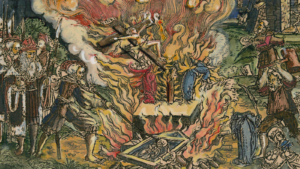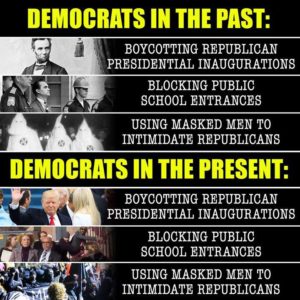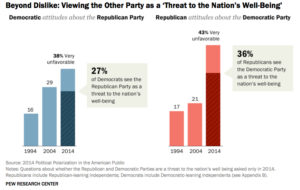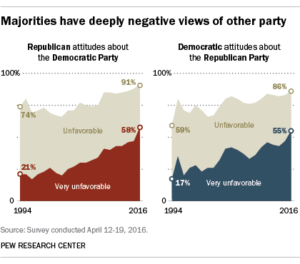
The Reformation Brought Freedom of Faith
The Reformation also Brought Endless Wars
As a Christian I am grateful to the revival of the true Gospel which is called the Reformation. Yet, it was an unintentional consequence of wanting a discussion of differences between Roman Catholic Church (RCC) and biblical hermeneutical interpretation by individuals rather than by the monolithic RCC via the Pope. The Reformation brought hope but it also entailed several hundred years of unrelenting and merciless wars across Europe. Violence that extends down to today’s political climate in America and across Europe; a climate of unrelenting hostility against those who think differently.
In my last post, Awokeness, A Revivalism of Intolerence, I discussed the efforts of Protestantism to erect God’s government here on earth using the power of the state. This became the Federalist party which morphed into the Whig party which became the Republican party that has remained to this day. The aims of this party have always been built on the triad of: Big Government; Tariffs {Taxes} and Big Business {Crony Capitalism}. The major constituents of these parties were the “born again” emotional salvation that was to extend throughout society even at the point of both the Law and the Gun. I am grateful for Murray Rothbard’s book, The Progressive Era, for suggesting the view that American politics was not so much a struggle for competing ideologies as it was a struggle between competing faiths; i.e., Protestant Pietists {Republican party} versus RCC and Protestant High Church liturgicals {Democratic party}. Today’s American political rhetoric and unyielding demagoguery harkens back the bitter European wars that followed the Reformation as both RCC and Protestants struggled for power, state power through a series of wars that were known for their violence and hatred {The European Holy Wars}. Though Americans think their politics is devoid of religion the opposite is the case: American politics, and that of every other government, is a conflict between opposing religions seeking to control governmental power.

This Propaganda Demonstrates the
Logical Fallacy of the False Dilemma
In the article, Lysander Spooner: Libertarian Pietist, really contains an insight that I believe Mr. Rothbard missed. Mr. Rothbard described the liturgicals as seeing their “salvation” contained in church rituals rather than in individual piety; thus, they were the people of small government, laissez faire economics and individualism {unless one was a slave of course}. While this was true I believe it also illustrates a blind spot in Mr. Rothbard’s understanding of the RCC and High Church Protestants (HCP) to both their faith and their government. The RCC throughout the Dark Ages sought to consolidate both ecclesiastical and governmental power in one person; but, could not quite manage this feat to copy the Roman emperors who had consolidated both ecclesiastical and governmental power in one person since Julius Caesar. Yet, the RCC, ash the HCP when they broke with the RCC during the Reformation remained committed to a strong central power in the RCC and those governments that supported the RCC. Thus, the parishioners of the RCC and HCP were a different type of central power statist; thus, they saw the non-church government as inferior to Church government. This I believe is the reason the were for small government, open markets, etc. These would not be in competition to the aims of their Church goals. Opposed to them were the Protestants who vilified the RCC and HCP and sought to use public education to convert their children to the right beliefs.

Throughout History Religious Groups
Were Always Intolerance of Other Faiths
“The pietist Republicans did similarly for their mass base, pointing out that big government should regulate and control economic matters as it should control morality. In this stance, the Republicans followed in the footsteps of their predecessors, the Whigs…” (Lysander Spooner: Libertarian Pietist). Lysander Spooner was an interesting 19th century American philosopher who began as an unyielding pietistic Republican but turned against this position due to abuse of the power of the state to enforce morality, and political views on everyone. While he believed vices should be subject to one’s religious conscience, he did not think these should be considered crimes or under government control. Yet, even his own compatriots turned against this viewpoint for political power. This would be an empty historical point if not for William Jennings Bryant, a great pietist, swept piety into the liturgical Democratic party in 1896 as the Republicans were toning down their pietistic rhetoric as it cost them votes and elections. However, Republicans did not lose their piety; they just changed its focus and Theodore Roosevelt, Republican, became the first Progressive President. His rhetoric carried religious fervor that catalyzed a nation in its mark toward socialism. Once the Democrats saw the power of Progressive pietism they threw off William Jennings Bryant to followed another religious figure, Woodrow Wilson, who galvanized the world with his Progressive zealousness that remains enshrined today in the United Nations (The Transformation of the American Party System).

These political attitudes mirror the
Attitudes of the Reformation Aftermath
Now obviously, there have been several changes in the positions of these parties during the 20th century; however, both parties remain parties of faiths. Propagandists such as Dinesh S’Souza have produced entertaining anti-Democratic propaganda and hid the Republican sins behind a the curtains. The Democrats have done much the same in adopting the philosophy of Mr. Soros’ Reflexivity with its Fertile Fallacies and Intolerance of Tolerance methodologies. Both seem intractable and they are! These are two mutually exclusive religious viewpoints that cannot tolerate each other. This should not surprise Americans. Our early history demonstrated the intolerance of differing viewpoints and fought a war to prove which viewpoint was correct!
While the Republicans seek to wrap themselves in a Christian clothe coat, the Democrats have embraced secular humanism as their religion of choice. Yet, both parties worship strong central government, socialism. Republicans promote national socialism; Democrats international socialism. Nationalism is deemed an unacceptable concept; thus, international socialism will win out as demonstrated in the Bible. The Western regions will come under the sway of one leader promoted by his religious colleague and proclaim himself as the master of everyone. The other major regions of the globe will come to war to determine who is the greatest to rule over all at the mountain of Megiddo.
In every group there are 10% ardent supporters, 10% vehement opposers and 80% democratic sheep who will follow the bribes. As long as events do not impact them and disrupt their favored desires they will ignore the truth and hide their heads in the sand until it is too late to have much influence. But Christians should not be in any of these camps! Socialism is not of God and interferes with the propagation of the Gospel being viewed as against the rule of man. Christians need to ask God to remove the veil of slumber from our eyes and see the violence of the world that is encouraged even by our own country. Yet, as long as people can have their pleasures and pursue their empty goals they will be happy with the facade until the day it is no longer needed. But, Christians should not be in this number that are blinded by the god of this world (2Th 2:1-12). In the end both of these religions will rise up to eliminate true Christianity and those who follow Christ just as the Roman emperors murdered those who would not burn incense to the Emperor each year as a sign of fealty. If the choice were demanded today would you submit to the party of your choice or suffer for being with Christ, outside the camp (He 13:12-15)?
